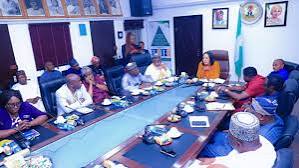The Human and Environmental Development Agenda (HEDA Resource Centre) has called on the Nigerian Government to prioritize the welfare of Nigerian workers in the ongoing minimum wage negotiations, citing the current economic realities that render the proposed wage of N62,000 by the federal government grossly inadequate to meet the basic needs of workers and their families.
 In a statement issued and signed by HEDA Chairman, Olanrewaju Suraju, the group condemned the recent claim by the Nigerian Governors Forum that states cannot afford a minimum wage of N60,000, given the history of corruption and embezzlement among governors. The statement emphasized that it is hypocritical for governors accused of looting billions of Naira from the states, and benefiting from increased federal allocations, to claim they cannot afford a living wage for workers.
In a statement issued and signed by HEDA Chairman, Olanrewaju Suraju, the group condemned the recent claim by the Nigerian Governors Forum that states cannot afford a minimum wage of N60,000, given the history of corruption and embezzlement among governors. The statement emphasized that it is hypocritical for governors accused of looting billions of Naira from the states, and benefiting from increased federal allocations, to claim they cannot afford a living wage for workers.
HEDA expressed concern over the potential long-term implications of the minimum wage negotiations on Nigeria’s future, urging the tripartite committee to consider the current economic realities and the rising cost of living in Nigeria. The organization emphasized the need for a comprehensive approach to the negotiations, taking into account the history of corruption and embezzlement among governors and other public officials to ensure fair compensation for workers.
The statement further called on President Bola Tinubu’s government to prioritize the welfare of Nigerians and to order the downward review of the recent astronomical electricity tariff imposed on the country as part of the negotiation for a minimum wage that reflects the true value of workers’ labor.
HEDA highlighted the importance of promoting economic justice and prosperity for all Nigerians, emphasizing its commitment to advocating for policies that ensure fair compensation and promote economic justice and prosperity for all citizens.
The organization’s stance underscores the significance of fair and sustainable minimum wage negotiations that consider the economic realities and the welfare of workers, urging the government to address the impact of corruption and prioritize the well-being of all Nigerians.
As the minimum wage negotiations continue, HEDA’s call for a just society where workers are valued and compensated fairly reflects the need for policies that promote economic justice and prosperity for all Nigerians.
The organization’s advocacy for fair compensation and economic justice aligns with the broader goal of ensuring that workers are adequately valued and compensated in line with the economic realities and the true value of their labor.




